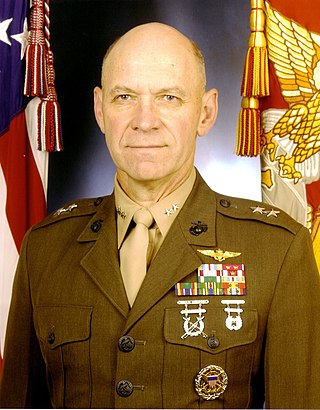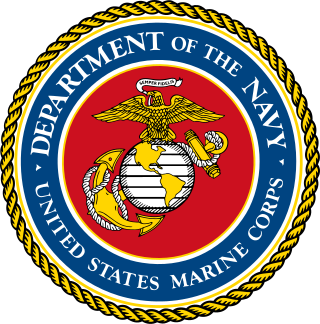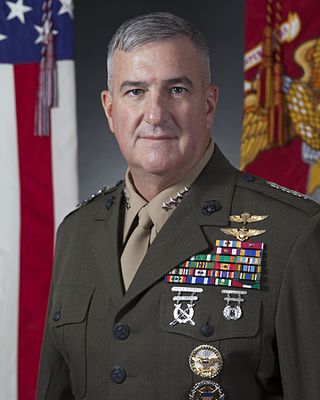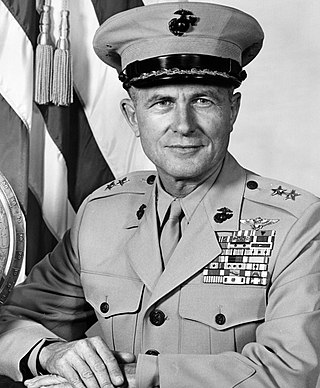
George Joseph Trautman III is a retired U.S. Marine Lieutenant General served as the Deputy Commandant for Aviation of the United States Marine Corps from 2007 to 2011. He retired from active duty military service on March 31, 2011.

Marine Medium Tiltrotor Squadron 161 (VMM-161) is a United States Marine Corps tiltrotor squadron that operates the MV-22 Osprey. The squadron, known as the "Greyhawks", is based at Marine Corps Air Station Miramar, California and falls under the command of Marine Aircraft Group 16 (MAG-16) and the 3rd Marine Aircraft Wing. The squadron has the distinction of being the first helicopter transport squadron in the world and regularly utilizes the phrase "The First, The Best".

Marine Heavy Helicopter Squadron 361 (HMH-361) is a United States Marine Corps helicopter squadron consisting of CH-53E Super Stallion transport helicopters. The squadron, known as the "Flying Tigers", is based at Marine Corps Air Station Miramar in California, and falls under the command of Marine Aircraft Group 16 (MAG-16) and the 3rd Marine Aircraft Wing.

Marine Heavy Helicopter Squadron 466 (HMH-466) is a United States Marine Corps helicopter squadron consisting of CH-53E Super Stallion transport helicopters. The squadron, known as the "Wolfpack", is based at Marine Corps Air Station Miramar, California and falls under the command of Marine Aircraft Group 16 (MAG-16) and the 3rd Marine Aircraft Wing.

Duane D. Thiessen is a retired lieutenant general in the United States Marine Corps, and is the past commander of the United States Marine Corps Forces Pacific, serving from September 2, 2010, until his retirement on August 7, 2012. Lt. General Thiessen is currently serving as president and CEO of the National Naval Aviation Museum Foundation located on Naval Air Station Pensacola.

Keith Barr McCutcheon was a highly decorated Marine Corps four-star general and aviator seeing combat in World War II, the Korean War, and the Vietnam War. He earned the Distinguished Flying Cross and ten Air Medals.

Robert Magnus is a retired United States Marine Corps four-star general who served as the 30th Assistant Commandant of the Marine Corps from September 8, 2005, to July 2, 2008. He retired from active duty on July 17, 2008, after 38 years of total service.

William D. Catto is a United States Marine Corps major general who is the chief of staff of the United States European Command. He assumed the post in July 2006, becoming the first U.S. Marine to hold the role. Catto has served over 10 years in command assignments at the lieutenant colonel, colonel, brigadier general, and major general ranks.

The United States Marine Corps is organized within the Department of the Navy, which is led by the Secretary of the Navy (SECNAV). The most senior Marine commissioned officer is the Commandant of the Marine Corps, responsible for organizing, recruiting, training, and equipping the Marine Corps so that it is ready for operation under the command of the unified combatant commanders. The Marine Corps is organized into four principal subdivisions: Headquarters Marine Corps, the Operating Forces, the Supporting Establishment, and the Marine Forces Reserve.

John Kerry Davis, also known as J.K. Davis, was a United States Marine Corps four-star general. Davis, a Vietnam War veteran and naval aviator, served as the Commanding General of the 3rd Marine Aircraft Wing (1977–1978) and the 1st Marine Aircraft Wing (1978-1978). His final assignment was as the Assistant Commandant of the Marine Corps from July 1, 1983, to June 1, 1986.

Carl B. Jensen is a retired United States Marine Corps general officer whose last command was Marine Corps Installations East. Jensen retired from active duty on July 22, 2011 after 36 years of service.

The United States Marine Corps Aviation (USMCA) is the aircraft arm of the United States Marine Corps. Aviation units within the Marine Corps are assigned to support the Marine Air-Ground Task Force, as the aviation combat element, by providing six functions: assault support, antiair warfare, close air support, electronic warfare, control of aircraft and missiles, and aerial reconnaissance. The Corps operates rotary-wing, tiltrotor, and fixed-wing aircraft mainly to provide transport and close air support to its ground forces. Other aircraft types are also used in a variety of support and special-purpose roles. All Marine Corps aviation falls under the influence of the Deputy Commandant for Aviation, whose job is to advise the Commandant of the Marine Corps in all matters relating to aviation, especially acquisition of new assets, conversions of current aircraft, maintenance, operation, and command.

Kevin B. Kuklok retired from the United States Marine Corps as a major general after over thirty years of service. He attended the University of North Dakota, graduating in June 1968 with a Bachelor of Science degree in chemical engineering. Major General Kuklok received his master's degree in Business Administration from the United States International University in San Diego, California.

Michael Phillip "Rifle" DeLong was a United States Marine Corps lieutenant general who served as deputy commander, United States Central Command, MacDill Air Force Base, Florida. From 2000 until his retirement in 2003, DeLong was second-in-command to General Tommy Franks, who, as commander of United States Central Command, was in charge of the war on terror, including Operation Iraqi Freedom in Iraq and Operation Enduring Freedom in Afghanistan.

Eugene R. Brady (1928-2011) was a United States Marine Corps officer and naval aviator who was the recipient of the Navy Cross and a later Silver Star for his heroic actions during two separate medevac missions taking wounded Marines from a landing zone while under fire during the Vietnam War. At the time of these awards, he was serving as the commanding officer of HMM-364, The Purple Foxes. He began his career as a fixed wing pilot and saw service in the Korean War with VMF-311. He did not transition to flying helicopters until 1968. During the course of his career he commanded four different squadrons, Marine Corps Air Station Tustin and Marine Aircraft Group 16. Colonel Brady retired from the Marine Corps in 1980 after more than 34 years of service.

Gregg A. Sturdevant is a retired United States Marine Corps Major General. At the time of his retirement, he was the Director of Strategic Planning and Policy (J5) for U.S. Pacific Command. From February 2012 to February 2013, he commanded the Third Marine Aircraft Wing (Forward), which included U.S. Marine Corps aviation assets then located at Camp Leatherneck / Camp Bastion in Afghanistan.

Glenn Michael Walters is a retired United States Marine Corps General, who served as the 34th Assistant Commandant of the Marine Corps from 2016 to 2018. He was appointed as the 20th President of his alma mater, The Citadel, on April 12, 2018.

David Allen Smith is an American politician and retired United States Marines Colonel. A Republican, he has served in the Florida Legislature representing the state's 38th House district since 2022, and previously served its 28th district from 2018 to 2022.

Robert Prescott Keller was a highly decorated Naval aviator in the United States Marine Corps with the rank of lieutenant general. He began his career as reserve pilot during World War II; he shot down one enemy aircraft and damaged two others during New Britain campaign. Keller distinguished himself again as pilot during Korean War and later reached general's rank during Vietnam War.

John W. Bullard Jr. is a retired U.S. Marine brigadier general who served as the commander of the 11th Marine Expeditionary Unit and Commanding General, Marine Corps Installations West - Marine Corps Base Camp Pendleton.























